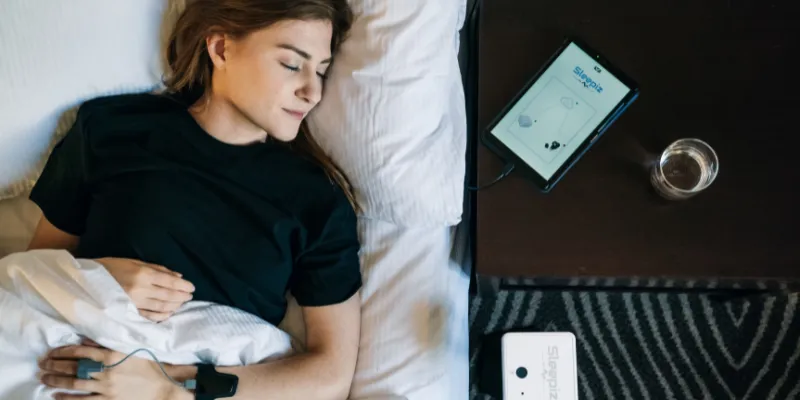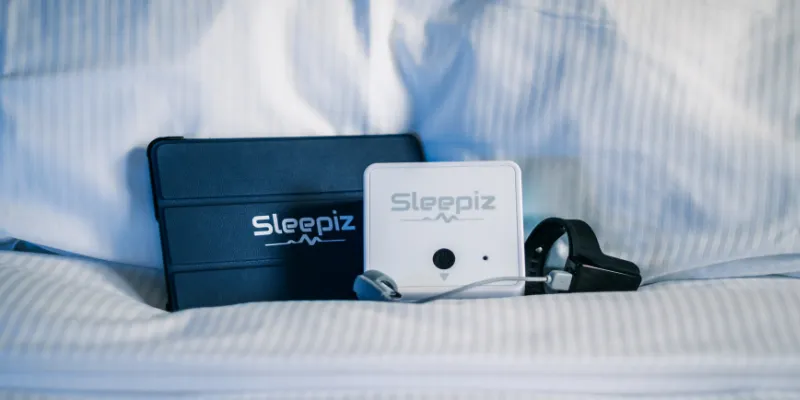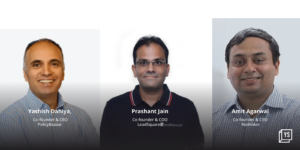Almost five years back, a group of researchers was working on solving problems related to the complications of a sleep study at ETH Zurich, a public research university in Zurich, Switzerland. Soumya Sundar Dash was invited to the sleep lab to share his expert opinion on the study being conducted. Upon entering the room, when he noticed that 32 wires were plugged into the participant to conduct the study, he wondered, “How can someone sleep naturally with so many wires attached and how correct would that data point be?”
The deliberation over this question led Soumya to co-found Sleepiz, along with Marc Rullan and Max Sieghold in 2018. An engineer by training, Soumya put all the knowledge he had gathered from his specialisation in wireless signal analysis and his Ph.D. in electromagnetic fields, to come up with a wireless solution that would enable a faster diagnosis of sleep disorders and wider access to sleep data for all.
And thus was born Sleepiz One +, a device that fits on the palm to diagnose sleep disorders like sleep apnea – a serious sleep disorder when a person’s breathing is interrupted during sleep – without touching the patient. The same technology has another important use case, wherein it can enable monitoring of multiple respiratory diseases in a hospital or home setting. With Sleepiz One+, early detection of ‘code blue’ incidents, a hospital’s emergency code, is possible which increases the opportunity to save more lives.
A combination of AI and machine-learning powered devices can deliver unique insights to healthcare teams, empowering them to focus on providing the best care. More often than not, continuous monitoring technology can largely improve patient outcomes.
How the device works

Sleepiz provides 24/7 remote patient monitoring, wherein the device (Sleepiz One+) is placed adjacent to a patient’s hospital bed and their vitals’ information is recorded continuously. The information is transmitted securely to cloud servers, analysed, and displayed in real-time on a central dashboard for a healthcare practitioner. An automated alert system further triggers meaningful notifications, eliminating delays once a patient’s condition starts to deteriorate.
The device, which is medically approved in 36 countries, uses a combination of radar technology, signal processing, and machine learning algorithms. It transmits electromagnetic waves, which are invisible to the naked eye, and these waves get reflected off the human body. The device measures these reflections and from the data generated micro-motions of the person are computed. Sleepiz One+ can detect the movements of the body itself such as an individual’s sleeping position or actions of their limbs. It can also compute respiratory patterns and pulse rate from the heartbeat. All this information is then gathered, and advanced signal processing is used to classify them.
A device like Sleepiz One+ is completely wireless and hence a non-invasive process to monitor patients. Additionally, the ease of use of the solution enables one to use the solution for post-operative care or monitor chronic illnesses in the comfort of your room at your convenience.
Journey so far
Overcoming multiple challenges due to COVID-19 and many regulatory hurdles, Sleepiz got its first medical device approval in 2020. “Our teams were working remotely during this time, spanning two continents and time zones, to bring this product into the market,” says Soumya. In the last two years, Sleepiz has successfully launched its device in the European Union (EU) and United States of America (USA), enabling them to commercialise in 30+ countries.
“We started off with building the first digital sleep lab in Switzerland at the end of last year and we are already the largest sleep lab in the country,” he informed. Soon after Switzerland, the company entered the Indian market in the mid of 2022 and since then have been providing real-time health updates to hospitals and doctors in the US and India via a B2B business model.
Sleepiz functions on a subscription-based revenue model and their latest funding was a Series A round, where they raised a total investment of 6.2 million Swiss Francs. Intending to impact lakhs of lives already in its first year of operations, the startup caters to government and private hospitals wherein there is a lack of multiparameter monitoring in real time.
“Our focus is to partner with healthcare providers, enabling them to leverage our medical-grade, powerful yet easy solution as a value-add in their health system,” says Soumya. The objective is to provide doctors and nurses with real-time insights into their patients’ health, thereby reducing administrative burden and ultimately, encouraging early intervention.
What sets Sleepiz apart?
The cloud-connected technology eliminates the need for a nurse practitioner to spot-check a patient’s psychological parameters every few hours – a process prone to attract errors during the hospitals’ “dark hours” of 2-6am.
For any nurse, the device is easy to set up and use with absolutely no installation required. All they have to do is place the device at a certain distance from the patient’s bed and plug it to a power socket. Once they turn on the one button on the device, the device will start recording and displaying computed insights on a central, control room dashboard or even on a mobile phone for doctors on-the-go.
Sleepiz’s 24/7 CARE team, consisting of on-ground field engineers for any troubleshooting and virtual telehealth professionals, provide automated notifications on vitals’ that drop below identified thresholds, which signals to the staff on duty to immediately attend to the said patient. Further, Sleepiz is able to provide medical reports identifying medical parameters like oxygen desaturation levels, heart rate, and breathing rate which combined with trend analysis, is a powerful tool in chronic disease management.
Foray into the Indian market

After launching in Switzerland, Soumya decided to help people back home. The company already had an office in India but earlier it was only being used for software development. It was only in mid-2022 when Sleepiz decided to commercialise the products here as well.
Ankit Anand, Head of India Business and Software elaborates on the origins of the current business model of detecting code blue early in hospital wards. During the second wave of COVID-19, Sleepiz worked on projects with AIIMS Patna and conducted remote patient monitoring. They also worked with other hospitals like Civil Hospital and SMS Multispecialty Hospital in Ahmedabad for hospital usage that led to identifying 7000+ life-saving deteriorations.
Guiding Sleepiz in their India journey is Swissnex, a launchpad for Swiss startups to expand into the Indian market. As a direct representation of the Swiss government in India, they are a zero-equity accelerator and have helped over 60 startups for their entry into the Indian market.
“We started our India market journey together with Swissnex in India. Since the day we launched here, they have been our thought-partner, helping us in finding the right marketing channel, and partners and helping us make meaningful business introductions, which has been very helpful in putting together the right strategy for this market,” says Anand.
Dr Swetha Suresh, Head of Innovation for Swissnex in India also mentors Sleepiz. She says, “Sleepiz is the perfect representation of the co-innovation capacity of India and Switzerland, and the impact it can have beyond borders. Their biggest R&D center is in Pune. This has enabled the creation of the world’s first contactless vital sign monitor, medically approved in 36 countries – a testimony to how we can tackle healthcare challenges together.”
The road ahead
“Sleepiz is trying to make a paradigm shift by being more proactive rather than reactive, by intervening early to get ahead of deterioration and potentially save a life,” says Soumya.
Staying true to their focus on medical-grade, convenient solutions which can also be used at-home, Sleepiz aims to further integrate themselves into the patient pathway by providing therapy and long-term monitoring as well. Currently, Sleepiz has started to address the respiratory space but there are multiple chronic diseases the company wishes to add to its pipeline.










